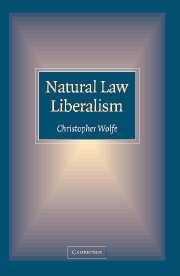Book contents
- Frontmatter
- Contents
- Acknowledgments
- Introduction
- PART I CONTEMPORARY LIBERALISM
- 1 Contemporary Liberal Exclusionism I: John Rawls's Antiperfectionist Liberalism
- 2 Contemporary Liberal Exclusionism II: Rawls, Macedo, and “Neutral” Liberal Public Reason
- 3 Contemporary Liberal Exclusionism III: Gutmann and Thompson on “Reciprocity”
- 4 Contemporary Liberalism and Autonomy I: Ronald Dworkin on Paternalism
- 5 Contemporary Liberalism and Autonomy II: Joseph Raz on Trust and Citizenship
- 6 “Offensive Liberalism”: Macedo and “Liberal” Education
- PART II LIBERALISM AND NATURAL LAW
- Index
4 - Contemporary Liberalism and Autonomy I: Ronald Dworkin on Paternalism
Ronald Dworkin
Published online by Cambridge University Press: 24 July 2009
- Frontmatter
- Contents
- Acknowledgments
- Introduction
- PART I CONTEMPORARY LIBERALISM
- 1 Contemporary Liberal Exclusionism I: John Rawls's Antiperfectionist Liberalism
- 2 Contemporary Liberal Exclusionism II: Rawls, Macedo, and “Neutral” Liberal Public Reason
- 3 Contemporary Liberal Exclusionism III: Gutmann and Thompson on “Reciprocity”
- 4 Contemporary Liberalism and Autonomy I: Ronald Dworkin on Paternalism
- 5 Contemporary Liberalism and Autonomy II: Joseph Raz on Trust and Citizenship
- 6 “Offensive Liberalism”: Macedo and “Liberal” Education
- PART II LIBERALISM AND NATURAL LAW
- Index
Summary
Another central aspect of contemporary liberalism, related to its commitment to a certain form of neutrality, is autonomy. The neutrality of the state is in the service of maximizing the autonomy of individuals, their freedom to choose to live whatever life they consider choiceworthy, consistent with the freedom of others to do the same.
One of the central issues between classical and modern political philosophy is the question of the purpose and scope of government. Classical political philosophy understood the goal of the polity as the fostering of a life of human excellence, for the community and its citizens. Modern (especially Anglo-American) political philosophy has tended to narrow the scope of the political community's concerns, focusing on the protection of human rights to “life, liberty, and the pursuit of happiness.” And within modern political philosophy, a tendency over time has been to narrow further the scope of legitimate government concerns, as suggested by the contrast between the political thought of John Locke and John Stuart Mill.
American law has been influenced to some extent by classical political thought and both forms (the earlier Lockean form, and the later Millian form) of modern liberal democratic thought. The common law Americans inherited from England, for example, could not be neatly categorized as reflecting classical or modern political philosophy, but contained elements of both.
- Type
- Chapter
- Information
- Natural Law Liberalism , pp. 57 - 81Publisher: Cambridge University PressPrint publication year: 2006

